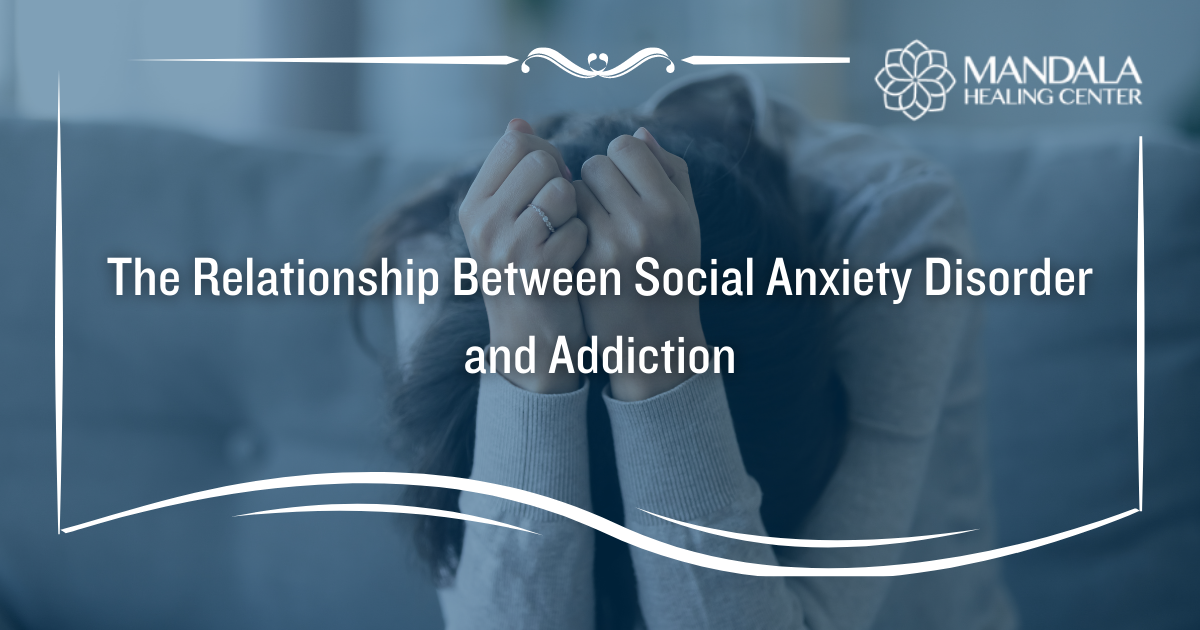Addiction is a chronic and progressive condition characterized by a dependency on alcohol or drugs. Individuals who suffer from addiction often struggle with co-occurring mental health conditions. One of the most common conditions to co-occur with addiction is a social anxiety disorder. According to The National Institutes of Health, 20% of individuals with a social anxiety disorder also suffer from a substance use disorder or addiction.[1]
Many people with social anxiety disorder struggle with an extreme fear of being judged by others. Someone with social anxiety may have difficulty going to crowded public places, struggle to maintain a job, and have difficulty making new friends. This can lead an individual to feel very isolated.
The symptoms of social anxiety disorder often lead individuals to self-medicate. Substances like alcohol or benzodiazepines may make a person feel more social and numb feelings of anxiety or panic. This causes the individual to become physically and emotionally dependent on the substance, leading to the comorbidity of social anxiety disorder and addiction.
What is Social Anxiety Disorder?
Social anxiety disorder (SoAD) is one of the most common forms of anxiety disorder. While many people believe social anxiety is just another term for “shyness”, this condition is much more than that. Individuals with social anxiety have an extreme fear of being judged, rejected, or ridiculed in social situations.
Social situations such as meeting new people, attending a work meeting, going to a crowded event, dating, job interviews, or having to speak with someone on the phone are all instances that trigger social anxiety. In other words, everyday tasks and responsibilities become difficult to complete due to social anxiety disorder.
Social anxiety disorder causes psychological and physical symptoms that can be extremely difficult to cope with. These symptoms may include:
- Rapid heart rate
- Feeling nauseous
- Sweating and trembling
- Feeling lightheaded and dizzy
- Feeling like their mind is going blank
- Having rigid posture and avoiding eye contact
- Speaking quietly or not talking at all
- Having a difficult time talking to people, even if the individual wishes they could
- Feeling embarrassed, awkward, and self-conscious in front of other people
- Having a strong fear of being judged by the people around them
- Avoiding places where other people might be
How Can Social Anxiety Disorder Lead to Addiction?
Social anxiety disorder causes individuals to feel isolated from others, even if they are in a room full of people. Oftentimes, individuals who struggle with social anxiety desperately wish they could overcome their fears and behave in a more “carefree” manner during social situations. Without proper treatment, this may lead an individual to begin self-medicating their symptoms of social anxiety.
Self-medicating is the act of treating one’s symptoms without professional advice. Most individuals self-medicate with the use of drugs or alcohol. Individuals with social anxiety tend to use alcohol, benzodiazepines (Xanax or Ativan), marijuana, and even stimulants like methamphetamine or cocaine to soother their symptoms. Drugs and alcohol may provide the individual with temporary feelings of inflated self-esteem and confidence. This leads the individual to keep taking substances every time they want to attend a social activity.
While drugs and alcohol may temporarily provide relief of symptoms, they also worsen the symptoms of social anxiety over time. Additionally, the individual will become mentally and physically dependent on the substance. This leads to the co-occurrence of social anxiety disorder and addiction.
How Can Addiction Lead to Social Anxiety Disorder?
Typically, individuals develop social anxiety early in life. However, someone can develop social anxiety disorder later on if they experience certain environmental or physical factors. One of the causes of social anxiety disorder is substance abuse and addiction.
There are many reasons that addiction would lead to the development of social anxiety disorder. Individuals who struggle with addiction also face a lot of guilt and shame due to the stigma of addiction and substance abuse in today’s society. This could cause an individual to develop a social anxiety disorder.
Additionally, individuals who are addicted to drugs often experience extremely distressing events. For example, it is not uncommon for addicts to be around constant drug deals, crimes, and get stuck in abusive situations. This could also lead to the development of social anxiety disorder, as they are dealing with highly stressful social situations throughout their lives.
Statistics on Social Anxiety and Addiction
The following list contains important statistics on social anxiety disorder and addiction:[2,3,4]
- 15 million adults (7% of the population) struggle with social anxiety disorder in a given year.
- 20% of individuals with SoAD also struggle with alcoholism
- 29% of individuals dependent on marijuana also struggle with a social anxiety disorder
- Adolescents who struggle with social anxiety disorder are 7x more likely to become dependent on cannabis
- About 40% of methamphetamine users have a history of anxiety disorders
Treatment for Social Anxiety Disorder and Addiction
Social anxiety disorder and addiction are both conditions that require professional treatment. When an individual suffers from the dual diagnosis of SoAD and addiction, they must receive treatment for both conditions simultaneously. Without doing so, the individual is at risk of experiencing a relapse or re-emergence of social anxiety symptoms. Thankfully, dual diagnosis treatment centers like Mandala Healing Center are experienced in the treatment of social anxiety and addiction.
The Mandala Healing Center is committed to treating each person as a whole, integrating a healthy lifestyle that will help our patients truly heal from the inside out. At the core of healing is exceptional clinical care. Our dynamic addiction treatment methods provide a foundation for life-long recovery through addressing the underlying causes of suffering in today’s families. Our patients are empowered to reclaim their lives and restore their health, free from addiction and substance misuse.
Contact Mandala Healing Center today for more information on our dual diagnosis treatment program in West Palm Beach.
References:












